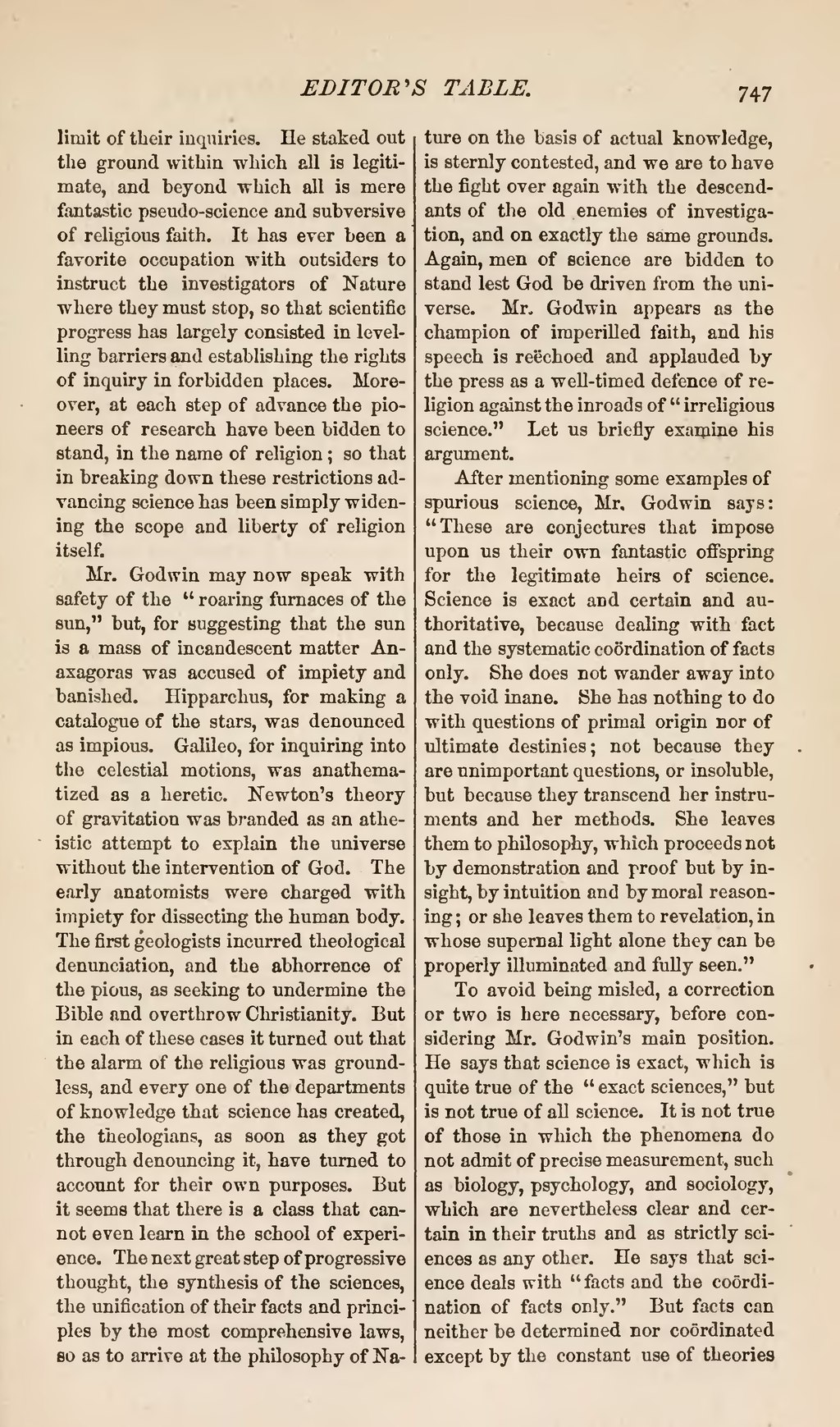limit of their inquiries. He staked out the ground within which all is legitimate, and beyond which all is mere fantastic pseudo-science and subversive of religious faith. It has ever been a favorite occupation with outsiders to instruct the investigators of Nature where they must stop, so that scientific progress has largely consisted in levelling barriers and establishing the rights of inquiry in forbidden places. Moreover, at each step of advance the pioneers of research have been bidden to stand, in the name of religion; so that in breaking down these restrictions advancing science has been simply widening the scope and liberty of religion itself.
Mr. Godwin may now speak with safety of the "roaring furnaces of the sun," but, for suggesting that the sun is a mass of incandescent matter Anaxagoras was accused of impiety and banished. Hipparchus, for making a catalogue of the stars, was denounced as impious. Galileo, for inquiring into the celestial motions, was anathematized as a heretic. Newton's theory of gravitation was branded as an atheistic attempt to explain the universe without the intervention of God. The early anatomists were charged with impiety for dissecting the human body. The first geologists incurred theological denunciation, and the abhorrence of the pious, as seeking to undermine the Bible and overthrow Christianity. But in each of these cases it turned out that the alarm of the religious was groundless, and every one of the departments of knowledge that science has created, the theologians, as soon as they got through denouncing it, have turned to account for their own purposes. But it seems that there is a class that cannot even learn in the school of experience. The next great step of progressive thought, the synthesis of the sciences, the unification of their facts and principles by the most comprehensive laws, so as to arrive at the philosophy of Nature on the basis of actual knowledge, is sternly contested, and we are to have the fight over again with the descendants of the old enemies of investigation, and on exactly the same grounds. Again, men of science are bidden to stand lest God be driven from the universe. Mr. Godwin appears as the champion of imperilled faith, and his speech is reëchoed and applauded by the press as a well-timed defence of religion against the inroads of "irreligious science." Let us briefly examine his argument.
After mentioning some examples of spurious science, Mr. Godwin says: "These are conjectures that impose upon us their own fantastic offspring for the legitimate heirs of science. Science is exact and certain and authoritative, because dealing with fact and the systematic coördination of facts only. She does not wander away into the void inane. She has nothing to do with questions of primal origin nor of ultimate destinies; not because they are unimportant questions, or insoluble, but because they transcend her instruments and her methods. She leaves them to philosophy, which proceeds not by demonstration and proof but by insight, by intuition and by moral reasoning; or she leaves them to revelation, in whose supernal light alone they can be properly illuminated and fully seen."
To avoid being misled, a correction or two is here necessary, before considering Mr. Godwin's main position. He says that science is exact, which is quite true of the "exact sciences," but is not true of all science. It is not true of those in which the phenomena do not admit of precise measurement, such as biology, psychology, and sociology, which are nevertheless clear and certain in their truths and as strictly sciences as any other. He says that science deals with "facts and the coördination of facts only." But facts can neither be determined nor coördinated except by the constant use of theories
